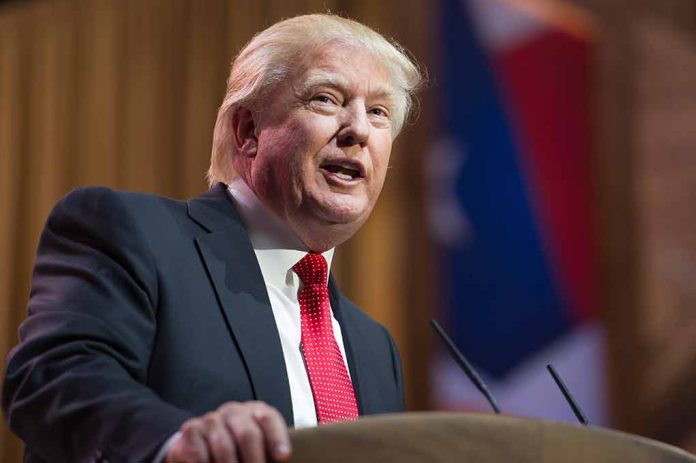
A federal court has ruled in favor of the Trump administration’s decision to terminate USAID contractors, dealing a blow to the Personal Services Contractor Association’s legal challenge against the massive cutbacks.
Key Takeaways
- A federal judge ruled that the Trump administration can proceed with firing USAID contractors after determining the plaintiffs failed to demonstrate irreparable harm.
- The administration plans to cancel over 90% of USAID’s contracts and grants as part of Trump’s executive order pausing foreign aid for a 90-day review.
- The Personal Services Contractor Association sued, claiming the administration exceeded its authority by freezing USAID funding without congressional consultation.
- The administration has placed most USAID staff on administrative leave and laid off approximately 1,600 U.S.-based employees.
- This lawsuit is one of four challenging the Trump administration’s actions regarding USAID and foreign aid priorities.
Court Ruling Supports Trump’s USAID Reform Efforts
A federal judge has delivered a significant victory to the Trump administration by ruling that it can proceed with terminating contractors working for the U.S. Agency for International Development (USAID). The ruling comes amid a substantial overhaul of foreign aid programs initiated by President Trump, who has long criticized certain international assistance programs as wasteful and misaligned with American priorities. The court’s decision allows the administration to continue with its planned cancellation of over 90% of USAID’s contracts and grants.
The Personal Services Contractor Association (PSC) filed the lawsuit, alleging the administration had exceeded its legal authority by freezing USAID’s funding without proper consultation with Congress. According to the PSC, the administration’s actions have caused significant disruptions for overseas contractors, including evictions and termination of vital services. Despite these claims, the federal judge determined that the contractors failed to demonstrate they would suffer irreparable harm if the cuts proceeded.
BOMBSHELL RULING! — OFFICIAL: Federal Judge Gives President Trump Power to Fire USAID Contractorshttps://t.co/ndKD8WzV0G
— Conservative Roof (@ConservRoof) March 6, 2025
Administration’s Justification and Plans
The Trump administration has defended its actions by pointing to what Secretary of State Marco Rubio characterized as “severe inefficiency” within USAID programs. The government argued in court that Rubio is authorized to review USAID’s funding priorities to address these inefficiencies and ensure alignment with American interests. The lawsuit follows Trump’s executive order that paused foreign aid for 90 days to conduct a comprehensive review of program effectiveness and alignment with U.S. strategic priorities.
While the administration has offered waivers for food and medicine programs deemed essential, communication and staffing issues have hindered the continuation of many aid contracts. The administration has already placed most USAID staff on administrative leave and laid off approximately 1,600 U.S.-based employees as part of its restructuring efforts. These moves represent one of the most significant shake-ups in the agency’s history.
Competing Visions for Foreign Aid
The legal battle over USAID funding highlights fundamentally different perspectives on the role and value of foreign assistance programs. Trump and many Republicans view numerous USAID programs as wasteful expenditures that don’t adequately serve American interests. They argue that a thorough review is necessary to ensure taxpayer dollars are being used efficiently and effectively. The administration’s actions suggest a potential consolidation of USAID functions within the State Department.
Democrats and foreign policy experts from across the political spectrum have expressed concern that the dramatic cutbacks could harm American interests abroad and diminish U.S. global influence. They contend that USAID programs are crucial for national security, humanitarian objectives, and maintaining America’s leadership position in international development. Critics also worry that USAID may lose its independence and specialized focus if merged more closely with the State Department’s diplomatic mission.
Ongoing Legal Challenges
The PSC’s lawsuit is just one of four legal challenges currently contesting the Trump administration’s actions regarding USAID. The administration has faced numerous lawsuits since taking office, primarily filed by Democratic attorneys general, federal workers, and labor unions. While the administration has secured some victories, including this ruling on USAID contractors, it has also faced setbacks in other areas, particularly regarding federal worker firings and certain policy initiatives.
Legal observers note that several of these cases may eventually reach the Supreme Court given the significant constitutional questions they raise about executive authority and the administration of federal agencies. The current ruling, however, represents an important win for the administration’s efforts to reshape American foreign aid priorities and restructure what it views as inefficient international assistance programs.
Sources:
Federal Judge Allows Trump Administration To Fire USAID Contractors



